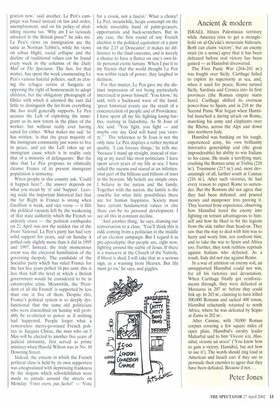Ancient & modern
ISRAEL blitzes Palestinian territory while America tries to get a stranglehold on al-Qa'eda's mountain hideouts. Both can claim 'victory', but an enemy must (in a sense) agree that it has been defeated before real victory has been gained — as Hannibal discovered.
The First Punic War (264-241 BC) was fought over Sicily. Carthage failed to exploit its superiority at sea, and, when it sued for peace, Rome turned Sicily, Sardinia and Corsica into its first provinces (the Roman empire starts here). Carthage shifted its overseas power-base to Spain, and in 218 BC the Second Punic War began when Hannibal launched a daring attack on Rome, marching his army and elephants over the Rhone, across the Alps and down into northern Italy.
Hannibal was banking on his tough, experienced army, his own brilliantly innovative generalship and (the great imponderable) his ability to win Italians to his cause. He made a terrifying start, crushing the Roman army at Trebia (218 BC), Trasirnene (217 Bc) and, most devastatingly of all, further south at Carinae (216 BC). After such victories, he had every reason to expect Rome to surrender. But the Romans did not agree that they had been defeated, and poured money and manpower into proving it. They learned from experience, observing how Hannibal lured the enemy into fighting on terrain advantageous to himself and how he liked to hit the legions from the side rather than head-on. They saw that the way to deal with him was to harry and worry him, not confront him; and to take the war to Spain and Africa too. Further, they took ruthless reprisals against Italians who defected. As a result, Italy did not rise against Rome.
In a war of attrition on enemy soil, an unsupported Hannibal could not win, for all his victories and devastation. When Carthage finally got reinforcements through, they were defeated at Metaurus in 207 BC before they could link up. In 203 Bc, claiming to have killed 300,000 Romans and sacked 400 towns, Hannibal reluctantly returned to north Africa, where he was defeated by Scipio at Zama in 202 BC.
After Cannae, with 50,000 Roman corpses covering a few square miles of open plain, Hannibars cavalry leader Maharbal said to him Vincere xis, Hannibal, victoria uti nescis' (You know how to gain a victory, Hannibal, but not how to use it'). The words should ring loud in American and Israeli ears if they are to persuade their enemies to agree that they have been defeated. Because if not. .
Peter Jones


































































 Previous page
Previous page